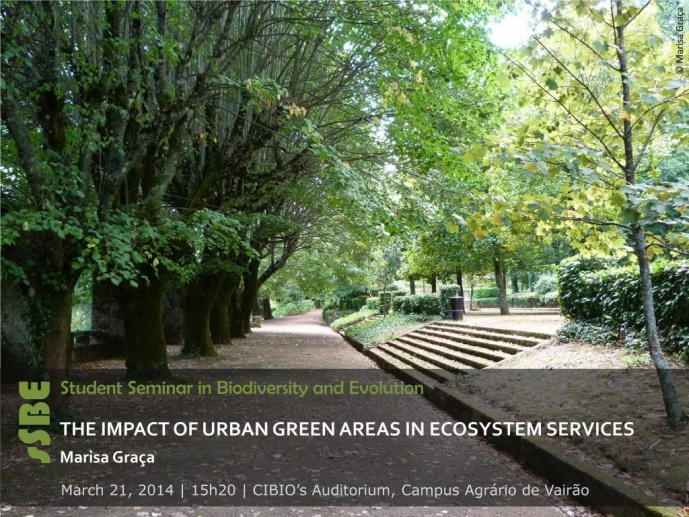THE IMPACT OF URBAN GREEN AREAS IN ECOSYSTEM SERVICES

STUDENT SEMINAR IN BIODIVERSITY AND EVOLUTION

Research on ecosystem services and the factors that influence their proficiency is essential to allow cities to adopt policies that lead to resource-efficient design and structure, and greater resilience.
We rely on urban ecosystems for the provision of essential benefits such as temperature and air quality regulation, runoff and flooding mitigation, cultural identity, educational and aesthetic values, among others.
However, urban planning often fails to incorporate scientific inputs from Ecology. In part, this happens because frequently scientific knowledge is not immediately nor easily translatable into objective tools or guidelines for planners and designers.
Simultaneously, proficiency of non-tradable services such as air filtration, thermal regulation, or contribution to the perception of the urban environment is difficult to assess accurately. Because of that, impacts in such services are rarely taken into account in decision making.
One way to overcome these difficulties is to improve the assessment of the ecosystem services provided by urban green areas, in order to better understand how their configuration and composition affects the benefits people derive from them.
The purpose of this seminar is to present i-Tree, a state-of-the-art, peer-reviewed software suite from the USDA Forest Service that provides urban and community forestry analysis and benefits assessment tools. The first case study of this PhD will be applying i-Tree ECO to Porto, in order to quantify the environmental services that trees provide and the structure of the urban forest.
Marisa Graça became a graduated landscape architect in 2004, and since then she was involved in the development and coordination of several landscape architecture projects and studies ranging from public to private investments.
Her professional experience raised several research questions about the gaps between urban ecology knowledge and the planning/design practice, that she currently addresses as a 1st year PhD Student in the Landscape Architecture Doctoral Program of the University of Porto (FCUP), integrated in the LPDM group, under the supervision of Mário Cunha and co-supervision of Paulo Farinha Marques.
Image credits: Marisa Graça